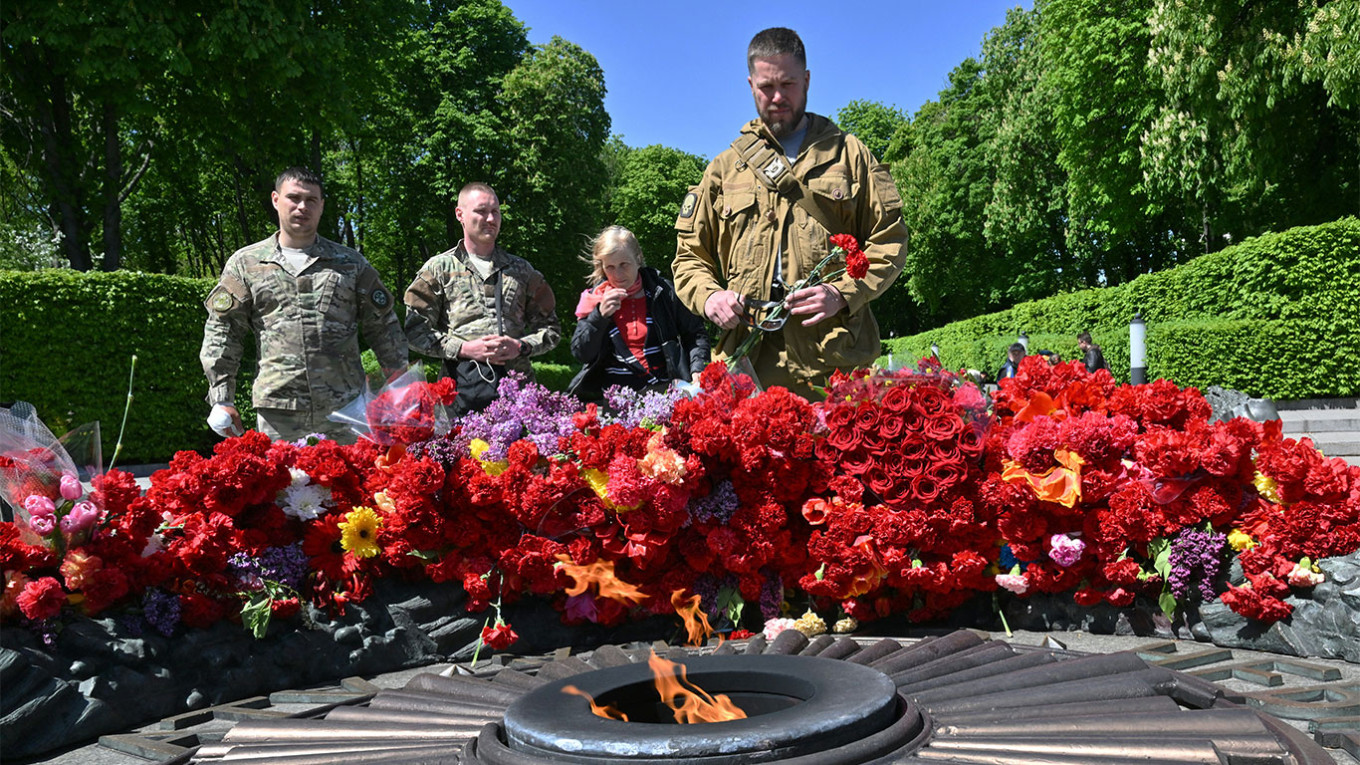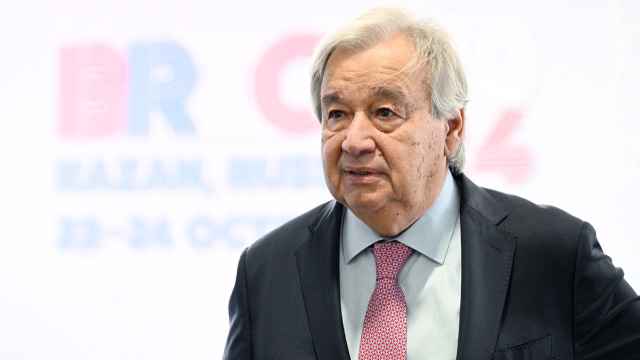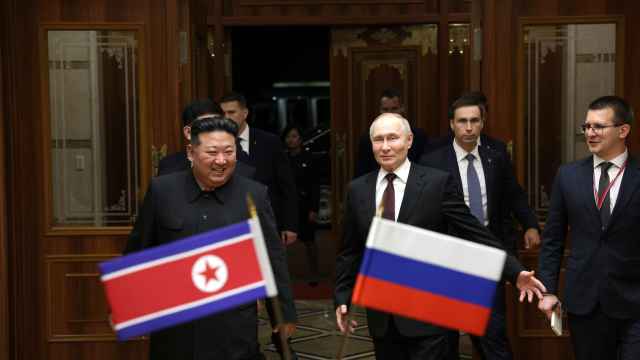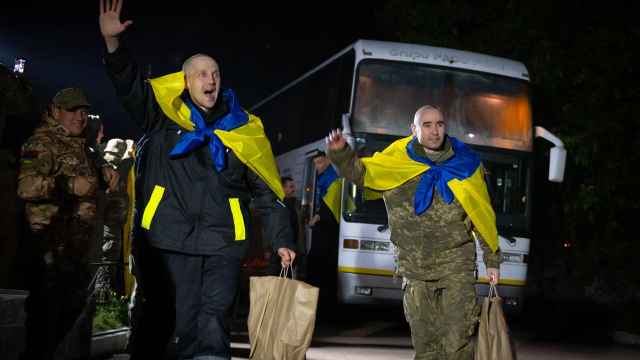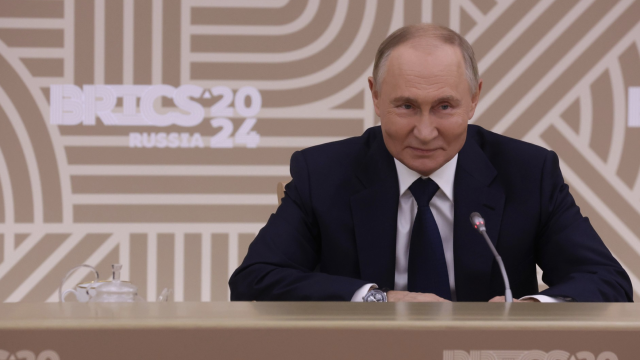The memory of World War II is powerful. Each country involved has its own prominent, often historically flawed, national myth born from the conflict. Did Britain really stand alone in 1940? Did the Soviet Union liberate Warsaw? Did the United States really play the leading role in defeating Hitler? Depending on one’s geographical location, these are all provocative questions. But their controversial nature is not based in historical disagreement so much as in the use of the war years to provide a transnational sense of morality as well as a national sense of self, status and place in the world.
Given how these narratives can fuel heightened emotions, it is unsurprising that memory wars — a term used to describe conflicts over irreconcilable visions of the past — have become real wars. From the very beginning of Russia’s war on Ukraine in 2014, Russian propagandists set out to demonize Ukrainians’ criticisms of Moscow’s brutal and corrupt regime as little more than ethno-nationalist and neo-fascist campaigns. For anyone with a passing interest in the two countries’ relations, this was hardly surprising. When Ukraine reasserted its statehood in 1990-1991, pro-Soviet media tried to discredit these aspirations by claiming Ukrainian idenity is tainted by the wartime fascist sympathies of some nationalists. In 2004, the Russian media depicted the Orange Revolution as an attack on the memory of what Russians call the Great Patriotic War.
Acknowledging how Russia misrepresented Ukrainian wartime nationalism does not mean one has to whitewash any crimes that members of Ukrainian nationalist organizations committed. There is a large public and scholarly debate over these matters. What is missing is a debate on why this historical chapter plays such a critical role in the context of the Russo-Ukrainian war today.
It is very difficult to find exact figures for the membership of underground resistance movements in any conflict. But some estimates suggest that the number of Ukrainians in the Ukrainian Insurgent Army (UPA), which fought for Ukrainian independence from the U.S.S.R., was in the low hundreds of thousands. Many of these were not Nazi collaborators, since they were fighting for Ukraine, not the Third Reich. Whether their vision of Ukraine was fascist or not is a separate issue. Some certainly saw it that way, particularly in Stepan Bandera’s radical faction. But the UPA was a broad church that included left-wing figures. Lacking knowledge of this complicated history of the UPA and Ukraine during and after World War II is no excuse for accepting Russia’s simplifications.
There were around 250,000 genuine Ukrainian collaborators who fought for the German armed forces. In comparison, over 7 million Ukrainians fought in the Red Army. It is to their memory that President Volodymyr Zelensky appeals in his speeches, in his celebrations of Ukrainian bravery, and in his marking of Ukraine’s present-day sacrifices.
That said, it remains unclear why Ukrainians should be singled out as collaborators above other nations, including Russians. Almost 1 million Russians are thought to have fought for Andrei Vlasov army of defectors alone. As in many countries occupied by the Nazis, collaboration was prolific in Soviet Russian territories. There were numerous legions formed of majority ethnic Russian Soviet collaborators who fought under German command. Some Russian White movements in exile, such as the Russian Protective Corps, also fought in the Wehrmacht.
The involvement of Russians in such organizations is disguised or ignored in Russia and much of the rest of the world. In fact, many of these collaborators have been rehabilitated by the Russian authorities. Despite the widespread involvement of the Cossacks in fighting alongside the Nazis and against the Soviets, Putin has actively reinstated the Cossack myth of the Cossacks central role in defending the Russian Empire. Moscow has generously funded Cossack cadet schools, designed to raise young men in those same traditions. Traditions that lent themselves quite readily to collaboration with the Nazis.
Another youth organization, the Russian Cadet Corps, is based on the White emigre organizations of the same name which fought alongside of the Wehrmacht and against Tito’s partisans in Yugoslavia. It is remarkable that significant parts of Russia’s patriotic education system have roots which can be traced to WWII collaborators and Nazi sympathies.
This very brief foray into collaborationism and World War II history serves as a reminder to tread carefully whenever political actors deploy the memory of the war to justify events in the present. Russian propagandists harness the powerfully emotive cultural memory to disguise the real arguments they are making. When Russians claim Ukraine is destroying its true memory, they mean Kyiv is denying that Ukraine is nothing more than a province of Russia. When they say Ukraine’s dislike of Russia is rooted in fascism, they mean that Kyiv’s insistence on its independence is illegitimate. When they slander the Ukrainian government and army as the modern-day heirs to the Nazis, they are asserting their right, even duty, to kill them.
Relying on simplistic tricks, audience ignorance, and a fair few of its own goals from Ukrainians, Russia has managed to convince its people and even some beyond its borders that its genocidal war on Ukraine is a rerun of the Soviet-Nazi struggle, or at least a defense of those who want to honor that struggle. This propaganda is a profound insult to the memory of those who fought Nazism, and especially to the 8 million Ukrainians who lost their lives in World War II. Their struggle and the devastation wrought on their country was incomparable to the trauma inflicted on Western nations. Unlike Russia, that trauma spanned the totality of Ukraine’s territory.
But the problem is not so much whether Russia’s version of history is a lie (although it often is). Rather, it is that their narrative is being used to sell further lies. It is a lie that Ukrainians’ desire to be independent of Russia and forge their own national identity is the result of Nazism wielded to destroy the country’s true Russian identity. Kremlin propagandists point to the far-right origins of the Azov Battalion or the use of neo-Nazi symbols in other units. But if this is all it takes for a country to be fascist, as opposed to its style of government, then the same would apply to Russia. There are openly neo-Nazi units, such as Rusich, among Russia’s forces fighting in Ukraine.
In fact, Nazism has little relevance to either country. It is merely a distraction from the evils being committed right now. These are evils that can be prevented, albeit not by relitigating which side had more collaborators during World War II. Such debates are important, especially if they promote the expansion of historical knowledge. Alas, they rarely do. And they are irrelevant in relation to Russia’s war on Ukraine.
World War II doesn’t mean anything for the Putin regime beyond acting as a cypher for its right to be a great power Stripped of anti-fascism, the Putinist memory of the Great Patriotic War has become little more than a demand that Russia should be able to occupy and kill its neighbors. It is a way to recast Russia as the good guy, when it is so plainly the aggressor. Moscow perverts pastSoviet sacrifices to claim the world owes a debt of gratitude to Russia alone, disregarding the blood shed by so many other nations.
The Russian government and army do not care about respecting the memory of World War II. If they did, then why did they shoot the memorial to Ukrainian Red Army soldiers in the eastern Ukrainian village of Topolske they were occupying? Why did they bomb the Great Patriotic War memorial complex in Izium, now a city of ruins and mass graves? The answer to these questions is that, in Russia today, the memory of the Great Patriotic War is a loud, outrageous propaganda vehicle to distract from the reality of the war they are currently waging.
When we discuss who did what in 1942, we forget what we should really be talking about. Namely, what is happening in Ukraine now, and what might happen if Moscow gains the upper hand. Russians’ mass murder, torture, rape, kidnapping, and ethnic cleansing of Ukraine are the worst to have taken place on European soil for almost 80 years, since World War II itself. Anyone working to dismiss and twist this reality might wish to consider whether they will be deemed collaborators 80 years from now.
A Message from The Moscow Times:
Dear readers,
We are facing unprecedented challenges. Russia's Prosecutor General's Office has designated The Moscow Times as an "undesirable" organization, criminalizing our work and putting our staff at risk of prosecution. This follows our earlier unjust labeling as a "foreign agent."
These actions are direct attempts to silence independent journalism in Russia. The authorities claim our work "discredits the decisions of the Russian leadership." We see things differently: we strive to provide accurate, unbiased reporting on Russia.
We, the journalists of The Moscow Times, refuse to be silenced. But to continue our work, we need your help.
Your support, no matter how small, makes a world of difference. If you can, please support us monthly starting from just $2. It's quick to set up, and every contribution makes a significant impact.
By supporting The Moscow Times, you're defending open, independent journalism in the face of repression. Thank you for standing with us.
Remind me later.



